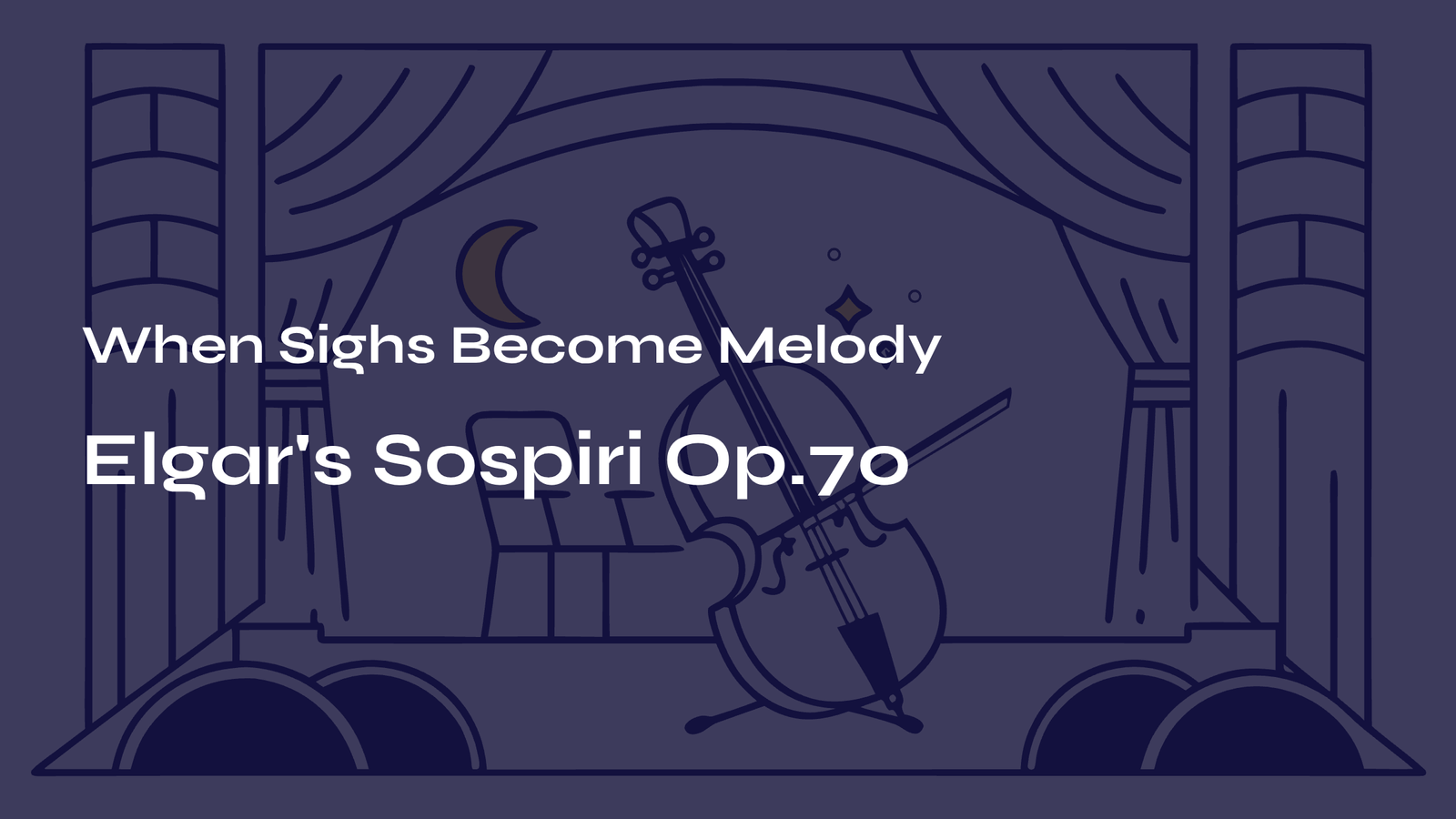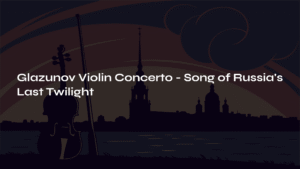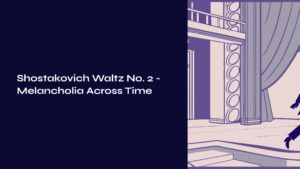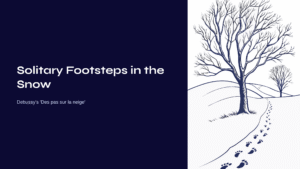Table of Contents

One Quiet Afternoon, From the Depths of the Heart
Sometimes there are emotions dwelling in a corner of our hearts that words simply cannot express. Neither joy nor sorrow, but something like a deep sigh. When I first heard Elgar’s “Sospiri,” I encountered exactly that feeling. As the cello’s low melody slowly began to flow, it felt as though someone was telling me the story hidden in the deepest recesses of my heart.
Sospiri—meaning “sighs” in Italian—captures humanity’s most profound emotions within just three minutes. Perhaps Elgar knew that the countless sighs we exhale in our daily lives could be transformed into such beautiful melody.

1914: A Composer’s Heart Before a Changing World
Edward Elgar completed this work in 1914, just before the outbreak of World War I. What must have been in the heart of this composer, already approaching sixty, as he faced a world in upheaval? Though he had established his reputation as Britain’s distinguished symphonic composer, this was also a period when he was feeling both personal anguish and the anxieties of his era.
Elgar’s Sospiri Op.70 was originally conceived as chamber music for cello and piano, or string quartet and piano. While orchestral arrangements were later created, the warmth and intimate emotional depth of the original scoring remain the work’s greatest appeal. Through this piece, Elgar seemed to want to sing not of grand symphonies or brilliant concertos, but of humanity’s most honest emotions.

From Sighs to Hope: A Three-Minute Emotional Journey
Quiet Beginning – Opening the Heart’s Door
Sospiri begins with gentle piano chords, like sitting alone in a quiet room, gazing out the window. Then the cello slowly unfolds its melody from the low register. Listen to that first glissando—doesn’t it truly sound like a deep sigh being exhaled?
The tempo is Adagio, flowing with deliberate slowness. There’s no need to rush. Emotions cannot be hurriedly expressed. When the first theme is presented, I always find myself taking a deep breath, as if the music is telling me, “Stop for a moment and look into your heart.”
Waves of Emotion – Beautiful Interplay of Tension and Release
As the main theme develops, Elgar guides us on an emotional journey. The cello’s melody rises and falls like waves, repeatedly ascending from that initial sigh to build emotional intensity before settling back into quietude.
What deserves attention here is the dialogue between piano (or string ensemble) and cello. Sometimes the cello leads while the piano follows; sometimes it’s the reverse. It’s like watching two friends trying to understand each other’s hearts. Have you ever had such a conversation with someone? Those moments when you seem to know each other’s thoughts without speaking?
A Moment of Light – The Comfort of Modulation to Major
Something magical happens in the middle section. The melody, which had been dwelling in minor-key poignancy, suddenly shifts to major and radiates warm light. In this moment, sighs seem to transform into smiles—Elgar’s small gift of comfort and hope to us.
Whenever I hear this major section, I think of sunlight briefly breaking through clouds. Though it doesn’t completely clear, that short moment alone lightens the heart. Elgar understood precisely how precious such moments are in music.
Quiet Conclusion – Finding Peace in the Afterglow
At the work’s end, the opening theme returns, but with a different feeling. The same sigh, yet now one of acceptance rather than resignation—a peaceful sigh gained after experiencing all emotions.
When the low strings’ harmony quietly concludes the piece, the pedal’s long resonance lingers in the room. In this silence, we can finally feel true comfort. Elgar doesn’t rush us even at the end, seeming to say, “Feel fully, and stay as long as you need.”

What I Found in Sospiri
Each time I listen to this work, I realize something: our sighs, too, have their own beauty. While the many sighs we exhale in daily life sometimes feel only negative, Elgar’s Sospiri tells us that such emotions are also human and can be quite beautiful.
Especially during the COVID-19 pandemic, the comfort this piece offers felt even more profound. The anxiety of facing an uncertain future, the loneliness that comes with extended solitude, and our hearts that must endure it all—Sospiri seemed to say that these feelings aren’t abnormal at all, but rather deeply human and natural.
The lingering resonance that remains in the heart long after the music ends—that is the true charm of Elgar’s Sospiri. Beyond simply beautiful melody, it’s music that understands and comforts the complex emotions within us.

Small Tips for Deeper Listening to Sospiri
If you’re hearing Elgar’s Sospiri for the first time, focus on a few key points.
First, listen carefully to that opening glissando. The moment when the cello slides gently upward from its low note will truly sound like a sigh. This passage sets the emotional tone for the entire piece, so don’t miss it.
Second, pay close attention to the middle section’s modulation to major. You’ll feel how dramatic the contrast is when it suddenly brightens. Here you can read the message of hope Elgar wanted to convey.
Finally, I recommend comparing different recordings. Janine Jansen with the London Chamber Orchestra offers a delicate and warm interpretation, while Steven Isserlis’s cello and piano version provides a more intimate, personal feeling. The same piece can offer completely different emotions depending on the performers.

Comfort That Transcends Time
Why does this work, composed by Elgar in 1914, still move us over a century later? Perhaps because fundamental human emotions transcend eras. The heart that sighs, seeks comfort, and harbors hope remains unchanged whether in 1914 or 2025.
Listening to Sospiri, I often reflect on how remarkable music as a language truly is, and why classical music remains necessary. In our rapidly changing world, the gift of taking time to pause and examine our hearts, of organizing complex emotions through beautiful melody—isn’t that what works like Elgar’s Sospiri offer us?
Next time you need solitude, when your heart feels complex and unsettled, listen to Elgar’s Sospiri. Though just three minutes long, within that time you can discover deep comfort along with new hope. Elgar will personally demonstrate that even sighs can sometimes become beautiful music.

Next Destination: Chopin’s Mazurka in A minor, Op. 17 No. 4
Having found comfort in Elgar’s profound sighs, how about encountering a different kind of beauty? Chopin’s Mazurka in A minor, Op. 17 No. 4 touches our hearts in yet another way from Sospiri.
This mazurka was completed in 1833 when Chopin was living and working in Paris, having left his homeland Poland. If Elgar’s Sospiri represents personal sighs and comfort, Chopin’s mazurka contains longing and nostalgia for his homeland. Both works are only 3-4 minutes long, yet the emotional depth contained within rivals any great symphony.
Particularly noteworthy is the difference in “temporality” between the two works. While Elgar’s Sospiri focuses on present-moment emotions, Chopin’s mazurka brings memories and yearning for the past into the present. Where Sospiri’s sighs lead to acceptance and peace, the mazurka’s melancholy sublimes into beautiful remembrance.
Chopin’s mazurka, performed on solo piano, offers a different kind of intimacy from Elgar’s chamber music warmth. Like sitting alone to write in a diary, personal and private emotions bloom one by one across the keyboard. If the comfort you felt from Elgar still lingers in your heart, Chopin’s mazurka will guide that comfort to an even deeper, more delicate dimension.
Why not try listening to both works consecutively? If Chopin’s opening chords follow before Elgar’s final resonance has completely faded, you’ll likely experience the healing power of music even more profoundly.



